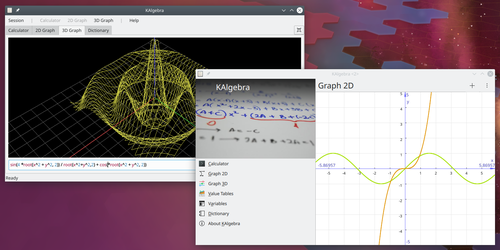KAlgebra: Difference between revisions
Pipesmoker (talk | contribs) No edit summary |
Pipesmoker (talk | contribs) |
||
| Line 54: | Line 54: | ||
==Documentation== | ==Documentation== | ||
[http://docs.kde.org/development/en/kdeedu/kalgebra/index.html '''KAlgebra''' Handbook] | * [http://docs.kde.org/development/en/kdeedu/kalgebra/index.html '''KAlgebra''' Handbook] | ||
[[Category:Education]] | [[Category:Education]] | ||
Revision as of 14:31, 4 July 2010
Home » Applications » Education » KAlgebra

|
KAlgebra is a calculator with symbolic and analysis features that lets you plot 2D and 3D functions as well as to easily calculate mathematical expressions.
It is part of the KDE Education Project. |

The Console Tab
When you first open KAlgebra a blank window shows up, this is the main work area for calculus.
Let's get started with a little example of how KAlgebra works, just type:
- 2+2
Then type Return and KAlgebra will show you the result. So far it's easy.
However, KAlgebra is much more powerful than that, it started as a simple calculator, but now it's almost a CAS. You can define variables this way:
- k:=3
And use them normally:
- k*4
And that will give you the result: 12 You can also define functions:
- f:=x->x^2
And then use them:
- f(3)
Which should return 9. You can define a function with as many variables as you want:
- g:=(x,y)->x*y
The possibilities of defining functions are endless if you combine this with the piecewise. Let's define the factor function:
- fact:=n->piecewise { n=0 ? 1, n=1 ? 1, ? n*fact(n-1) }
Yes! KAlgebra supports recursive functions. Give some values to n, to test it.
- fact(5)
- fact(3)
KAlgebra has recently started support for symbolic operations, to check it out, just type:
- x+x+x+x
or
- x*x
It doesn't work on some complex structures, though. Only basic support so far.
Moreover, KAlgebra has support for differentiation. An example of the syntax:
- diff(x^2:x)
If you have used KAlgebra, you will have noticed the syntax completion support, which is very helpful.
Another resource that can be useful to learn more about KAlgebra comes with KAlgebra: The Dictionary tab
It contains examples of every function supported by KAlgebra. Maybe the best way to learn how to do things with KAlgebra.
